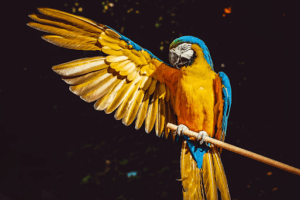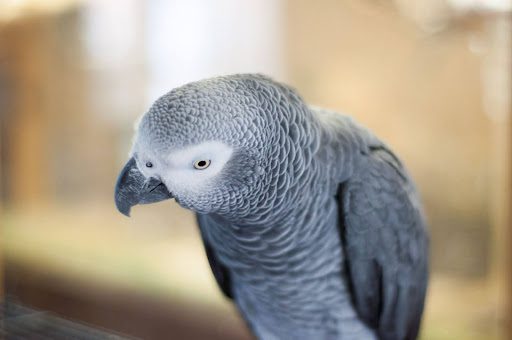
- 1 year health guarantee for all our exotic pets on sale
- [email protected]
African Grey Parrots stand out in the avian world for their exceptional intelligence and astounding ability to mimic human speech.

Photo by Hannah Dickens on Unsplash
These birds are not only popular pets but also intriguing subjects for those interested in avian cognitive abilities.
This comprehensive guide delves into every aspect of African Grey Parrots, offering valuable insights for both current owners and those considering adding one of these remarkable birds to their family.
The African Grey Parrot’s origin in the dense rainforests of Central and West Africa plays a crucial role in its development.
These rainforests are not just mere habitats but complex ecosystems brimming with life and diverse stimuli. In these rainforests, African Greys are exposed to a wide range of sounds, scents, and sights, contributing to their remarkable cognitive abilities.
The rich flora and fauna, along with the dynamic weather patterns of the rainforest, offer a stimulating environment that is hard to replicate in captivity.
In captivity, providing a living space that closely resembles their natural habitat is essential for their psychological well-being. This involves more than just a spacious cage; it requires creating an environment that offers varied and enriching experiences.
Regular opportunities for flight are vital for their physical health, while diverse toys and puzzles help stimulate their natural curiosity and intelligence.
Moreover, social interaction is a key component of their lives in the wild, so regular engagement with their human caretakers or bird companions is necessary to fulfill their social needs.
African Grey Parrots are distinguished by their grey plumage, accented by a strikingly bright red tail. Their eyes are expressive, often reflecting their mood and intelligence.
This distinct appearance is complemented by a physical structure that is primed for agility and precision. Their strong, curved beaks are adept at cracking nuts and seeds, while their zygodactyl feet—two toes pointing forward and two backward—allow them to grasp and manipulate objects with ease.
In terms of lifespan, African Greys are among the longest-living parrot species, with a life expectancy that can exceed 60 years in captivity under optimal care. This longevity, however, comes with the responsibility of long-term care, including addressing potential health issues.
They are prone to various ailments, such as feather plucking, which is often a sign of psychological distress, and respiratory diseases. Therefore, regular health check-ups and a keen eye on their behavior and physical condition are paramount.
African Grey Parrots are known for their sociable nature. In the wild, they live in flocks and exhibit complex social behaviors. This inherent sociability means they crave interaction and can develop deep bonds with their human caretakers.
Neglect or insufficient social interaction can lead to distress, manifesting in behavioral issues or health problems.
Their renowned ability to mimic human speech and other sounds is not just a party trick; it reflects their keen intelligence and attentive nature.
These birds are not just repeating sounds; they often understand and apply context to their vocalizations. Understanding their language, both spoken and body, is crucial for a harmonious relationship with these intelligent creatures.
Diet is crucial in maintaining the health of an African Grey Parrot. Their diet in the wild consists of a variety of fruits, nuts, and seeds, supplemented by the occasional insect or snail.
In captivity, a diet primarily composed of specially formulated pellets is recommended, as it ensures a balanced intake of all the necessary nutrients. Fresh fruits and vegetables add variety and additional nutrients to their diet.
However, it’s important to be mindful of foods that are toxic to birds, such as avocado, chocolate, and anything containing caffeine.
Supplements, especially those providing calcium and Vitamin A, can be necessary, particularly for birds on a seed-based diet, as seeds alone do not provide a balanced nutrition. Constant access to fresh, clean water is also essential for their health and well-being.
Replicating the African Grey’s natural habitat in a home environment involves more than just physical space. The cage should be large enough for them to fully extend their wings and fly short distances. Various perches of different sizes and materials, along with a variety of toys, can help keep them engaged and active.
Regular grooming is also necessary. This includes trimming their nails and, in some cases, their wings, to prevent injury. However, wing clipping should be done judiciously and preferably by a professional, as it can affect their ability to fly and, consequently, their overall health.
Breeding African Grey Parrots in captivity requires a thorough understanding of their needs. A quiet, stress-free environment is essential for successful breeding.
This includes a suitable nesting box and an environment that mimics the seclusion they would seek in the wild.
Raising chicks is a labor-intensive process, involving hand-feeding and careful monitoring to ensure proper development.
Training should begin early and focus on basic commands before moving to more complex tasks.
Positive reinforcement is much more effective than punishment in training these intelligent birds. Socialization is also crucial; it helps prevent the development of fear or aggression towards new people, environments, and experiences.
Owning an African Grey Parrot is a significant commitment. They can be noisy and messy, requiring regular cleaning and maintenance of their living space.
Prospective owners should be aware of the legalities concerning the ownership and trade of these birds to ensure they are not inadvertently supporting illegal wildlife trafficking.
In conclusion, while African Grey Parrots can make rewarding companions, they require dedicated care and a deep understanding of their needs to thrive in a domestic setting.
African Grey Parrots offer a blend of companionship and entertainment but require a substantial commitment to their care and well-being.
Understanding and meeting their needs is essential for a rewarding relationship. With dedicated care and a stimulating environment, the journey of owning an African Grey Parrot can be an incredibly fulfilling experience.
If you are interested in purchasing a pet African grey parrot then click the button below to get to our available African parrots for sale page.
Copyright © 2025 Compound Exotics All Rights Reserved.